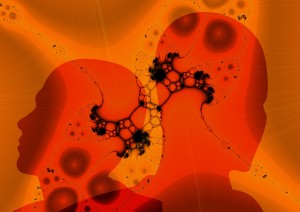Contributor: Judith Ann Miller, Ph.D., CACIII of 7 Bridges Recovery
Introducing The New Paradigm: Mind-Body Medicine
 The field of addiction recovery is evolving exponentially and is experiencing a dramatic paradigm shift, driven by neuroscience and the advent of naming addiction as a neurological, physiological, spiritual disease. The term integration does not adequately describe the dynamics of this evolution. The English language lacks the descriptive terms but this event is inclusive of a number of words as:
The field of addiction recovery is evolving exponentially and is experiencing a dramatic paradigm shift, driven by neuroscience and the advent of naming addiction as a neurological, physiological, spiritual disease. The term integration does not adequately describe the dynamics of this evolution. The English language lacks the descriptive terms but this event is inclusive of a number of words as:
- Alternative (alternative to traditional 12-step and the exclusive medication models as we now treat the causes rather than the symptoms of addiction).
- Comprehensive (inclusive of the traditional 12-Steps, body, mind, spirit based on neuroscience).
- Systematic as all bodily systems are involved.
- Complimentary as all components of recovery must be interwoven to accomplish sustainable recovery.
Pain Leads to Addiction
 The paradigm shift involves trauma-sensitive treatment, within the realm of neuroscience, and is the recognition of how the storms of life lead to addiction. Painful experiences lead people to escape the pain that becomes stored in every cell of the body and for some becomes unbearable. The attempt to resolve the intolerable and relieve the intense pain, leads to medication and/or self-medication which eventually creates addiction. Addiction also reaches every cell in the body, which ironically, does not relieve pain, but causes additional intolerable pain. This cycle of ‘pain begets pain’ is known to reach insanity and eventually death. Only by understanding the trauma-pain-relief seeking process can we understand the addiction evolution and plan successful intervention so that remission be realized.
The paradigm shift involves trauma-sensitive treatment, within the realm of neuroscience, and is the recognition of how the storms of life lead to addiction. Painful experiences lead people to escape the pain that becomes stored in every cell of the body and for some becomes unbearable. The attempt to resolve the intolerable and relieve the intense pain, leads to medication and/or self-medication which eventually creates addiction. Addiction also reaches every cell in the body, which ironically, does not relieve pain, but causes additional intolerable pain. This cycle of ‘pain begets pain’ is known to reach insanity and eventually death. Only by understanding the trauma-pain-relief seeking process can we understand the addiction evolution and plan successful intervention so that remission be realized.
Pain Management For Addiction Recovery
 Thus the key to successful addiction is pain management that allows the patient to feel relief enough to heal? The process of pain management is an all-inclusive approach that allows inflammation to dissipate; neurotransmitters to balance; brainwaves to synchronize; bodily systems to properly function; thinking to become positive; behavior to become productive; relationships to become mended; life’s purpose to become fulfilled.
Thus the key to successful addiction is pain management that allows the patient to feel relief enough to heal? The process of pain management is an all-inclusive approach that allows inflammation to dissipate; neurotransmitters to balance; brainwaves to synchronize; bodily systems to properly function; thinking to become positive; behavior to become productive; relationships to become mended; life’s purpose to become fulfilled.
Opiates For Pain Management
Humans have been using opiates for the at least 6000 years. The earliest recorded mention of opiates use was around 4000 BC, in Asia and, later, Europe and America. Notably their use is high in the United States.
Opium is collected from gummy fluid that oozes out of a cut in the developing seed pod of a poppy. The sap is then dried into a ball, or a powder, or an alcohol water extract. Opiates can be injected, smoked, taken orally as pills, or snorted.
The Effects of Opiates
 Opiates have many effects, including an immediate rush after injection, extreme relaxation, decreased sensation of pain, and decreased sexual drive. Sexual drive decreases as the opiate affects the release of hormones and transmitters that regulate sexual behavior. Other bodily functions effected by opiates of the body include constricting the pupils of the eyes; increased muscle tension; nausea and vomiting and slowed breathing
Opiates have many effects, including an immediate rush after injection, extreme relaxation, decreased sensation of pain, and decreased sexual drive. Sexual drive decreases as the opiate affects the release of hormones and transmitters that regulate sexual behavior. Other bodily functions effected by opiates of the body include constricting the pupils of the eyes; increased muscle tension; nausea and vomiting and slowed breathing
Opiates bind to specific brain receptors that involve neurotransmitters that control movement, moods, digestion, body temperature and breathing. These receptors cause neurotransmitters to fire at a high rate as they would in times of extreme stress. Opiates affect the structure and function of the brain, and alter one’s motivation and emotions. More specific effects of opiates on the brain include changes in the synapses and shapes of brain cells. Opiates are extremely addictive and is perhaps the most difficult dependence to overcome.
How Opioids Work
 Opioids attach to specific proteins called opioid receptors, which are found in the brain, spinal, the gastrointestinal tract, and other vital organs. When opioid drugs attach to these receptors, they can diminish the perception of pain. They also affect areas of the brain that deal with pleasure—which is why they are often abused to the point of addiction.
Opioids attach to specific proteins called opioid receptors, which are found in the brain, spinal, the gastrointestinal tract, and other vital organs. When opioid drugs attach to these receptors, they can diminish the perception of pain. They also affect areas of the brain that deal with pleasure—which is why they are often abused to the point of addiction.
About the Author:
 Dr. Judith Miller, PhD is a CAC III and creator of the 7 Bridges Recovery program. Fundamental to the program is the utilization of therapies in addition to individual and group counseling supplemented by the traditional 12 steps. Dr. Miller serves on the Colorado Attorney General’s Task Force on Prescription Drug Abuse and is a registered psychotherapist. She is the Executive Director of Courage to Change Ranches and the Serendipity Mountain Lodge – Colorado-based residential recovery centers for chemical dependency and prescription drug addiction.
Dr. Judith Miller, PhD is a CAC III and creator of the 7 Bridges Recovery program. Fundamental to the program is the utilization of therapies in addition to individual and group counseling supplemented by the traditional 12 steps. Dr. Miller serves on the Colorado Attorney General’s Task Force on Prescription Drug Abuse and is a registered psychotherapist. She is the Executive Director of Courage to Change Ranches and the Serendipity Mountain Lodge – Colorado-based residential recovery centers for chemical dependency and prescription drug addiction.
The opinions and views of our guest contributors are shared to provide a broad perspective of addictions and co-occurring disorders. These are not necessarily the views of Addiction Hope, but an effort to offer a discussion of various issues by different concerned individuals. We at Addiction Hope understand that addictions result from a combination of environmental and genetic factors. If you or a loved one are suffering from an addiction, please know that there is hope for you, and seek immediate professional help.
Last Updated & Reviewed By: Jacquelyn Ekern, MS, LPC on August 20, 2015. Published on AddictionHope.com
